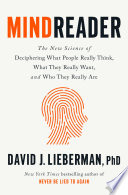

The book emphasizes the importance of understanding human behavior as a critical component of effective communication and relationship-building. It delves into psychological principles that govern how people think, feel, and act. By gaining insights into these behaviors, readers can enhance their ability to connect with others, whether in personal or professional contexts. The author provides practical examples and strategies for observing and interpreting body language, tone of voice, and other non-verbal cues that often reveal more than words alone. This understanding can lead to better negotiation tactics, improved team dynamics, and more meaningful interactions.
Continue readingEmpathy is presented as a powerful tool for influence in 'Mindreader.' The book explains how understanding others' emotions and perspectives can lead to more effective persuasion and collaboration. The author encourages readers to practice active listening and to genuinely engage with others' feelings, which can foster trust and rapport. By demonstrating empathy, individuals can position themselves as allies rather than adversaries, paving the way for more fruitful discussions and outcomes. This idea is particularly relevant in leadership and team settings, where fostering a supportive environment can enhance productivity and morale.
Continue readingThe book outlines the cognitive biases and heuristics that influence decision-making processes. By understanding these psychological factors, readers can become more aware of their own decision-making patterns and improve their judgment. The author discusses common pitfalls, such as confirmation bias and overconfidence, and offers strategies for mitigating their effects. This knowledge is invaluable for entrepreneurs and leaders who must make critical decisions under uncertainty. The book encourages readers to adopt a more analytical approach to decision-making, balancing intuition with rational analysis.
Continue readingTrust and credibility are foundational to any successful relationship, whether in business or personal life. 'Mindreader' explores the elements that contribute to building trust, such as consistency, transparency, and reliability. The author provides actionable tips for establishing credibility, including how to communicate effectively and how to follow through on commitments. By cultivating trust, individuals can enhance their influence and foster long-term relationships that are mutually beneficial. This idea is especially pertinent for leaders who must inspire confidence in their teams and stakeholders.
Continue readingEmotional intelligence (EI) is a central theme in 'Mindreader.' The book explains the components of EI, including self-awareness, self-regulation, motivation, empathy, and social skills. The author argues that high emotional intelligence can lead to better interpersonal relationships, conflict resolution, and leadership effectiveness. Readers are encouraged to develop their EI by reflecting on their own emotions and understanding the emotions of others. This development can lead to improved communication, collaboration, and overall success in both personal and professional domains.
Continue readingStorytelling is highlighted as a crucial element of effective communication in 'Mindreader.' The author discusses how narratives can engage audiences, convey complex ideas, and evoke emotional responses. By mastering the art of storytelling, individuals can enhance their presentations, marketing efforts, and interpersonal communications. The book provides frameworks for crafting compelling stories that resonate with listeners, making it a valuable resource for marketers, leaders, and anyone looking to improve their communication skills. This idea underscores the power of narrative in shaping perceptions and influencing behavior.
Continue readingThe book concludes with practical strategies for 'mind reading'—interpreting others' thoughts and feelings accurately. The author offers techniques for observing non-verbal cues, asking the right questions, and creating an environment conducive to open communication. By applying these strategies, readers can enhance their interpersonal skills and become more attuned to the needs and motivations of those around them. This practical approach empowers individuals to navigate complex social dynamics more effectively, whether in negotiations, team settings, or personal relationships.
Continue readingThe reading time for Mindreader depends on the reader's pace. However, this concise book summary covers the 7 key ideas from Mindreader, allowing you to quickly understand the main concepts, insights, and practical applications in around 21 min.
Mindreader is definitely worth reading. The book covers essential topics including Understanding Human Behavior, Empathy as a Tool for Influence, The Science of Decision Making, providing practical insights and actionable advice. Whether you read the full book or our concise summary, Mindreader delivers valuable knowledge that can help you improve your understanding and apply these concepts in your personal or professional life.
Mindreader was written by David J. Lieberman, PhD.
If you enjoyed Mindreader by David J. Lieberman, PhD and want to explore similar topics or deepen your understanding, we highly recommend these related book summaries:
These books cover related themes, complementary concepts, and will help you build upon the knowledge gained from Mindreader. Each of these summaries provides concise insights that can further enhance your understanding and practical application of the ideas presented in Mindreader.